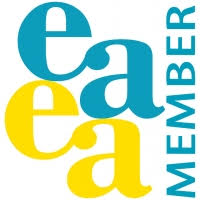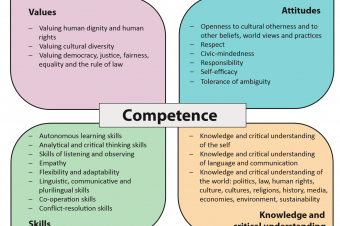https://www.youtube.com/watch?v=GvyeDr4dcfA
EPEA:
Alan, please tell us something about yourself. Who are you? How did you personally become interested in Prison Education?
Alan:
- I was born in England, grew up mainly in Northern Ireland (a very formative experience), studied German at University College London, fell in love in Germany and started work there before moving to Paris and then Brussels. Now I ́m back in Germany and in protest against Brexit have become a German citizen!
- Professionally, my whole career was devoted to European cooperation in the field of education, first in Higher Education, where I was closely involved in developing the ‘Erasmus’ programme, then in Adult Learning, especially as the European coordinator of ‘Grundtvig’.
- That was how I became interested in Prison Education. In the year 2000, soon after taking up my new position in charge of Adult learning, an information leaflet about the forthcoming meeting of National Directors and Coordinators of Prison Education fluttered across my desk. It was a field I knew nothing about and as I had also never been to Malta I thought it was about time I found out about both! In Malta I made the acquaintance of several stalwarts from the field and quickly became convinced that this was an aspect of Adult learning which deserved far greater attention than had been the case so far.
EPEA:
How in your view does Prison Education fit into the overall picture of adult learning? Are there any significant differences in teaching inside or outside the walls?
Alan:
- Though there may of course be some differences at first sight, I am really convinced that Prison Education should be seen as an integral part of Adult learning generally. There are several aspects to this. Firstly, there is the human rights aspect. Education is a basic right, and as such enshrined in international conventions and the Charter of Fundamental Rights of the EU. It is too often forgotten that this right continues even when someone is in prison.
- Second, Prison Education is a prime example of what Adult learning at its best can give to society.
- For example:
- Prison Education reaches out to marginalised individuals with negative experience from formal learning at school, providing them with a second chance route to learning, qualifications, and in particular to enhanced self-esteem. That is particularly important, given that prisoners on average have much lower educational attainment levels than those of the community at large.
- Prison Education helps improve basic skills in the extended sense of acquiring all forms of “literacy” needed for active participation in modern society (so not just reading and writing but also numeracy, digital literacy, financial literacy, consumer literacy, promoting a sense of civic awareness and healthy life-styles and so on).
- Furthermore, Prison Education contributes strongly to attaining other social goals such as combatting radicalisation, tackling substance abuse and of course reducing re-offending, the “price” of which in human, social and economic terms is astronomical.
- And third, Prison Education is an area where many of the key features of modern Adult learning strategies can be put to best effect:
- Developing innovative approaches to non-formal learning;
- “Placing the learner at the centre” instead of regarding adult education as a “take it or leave it” offer;
- Finding creative and effective means of recognising non-formally acquired knowledge, skills and competences, and:
- Putting in place the guidance and counselling services needed to make the learner-oriented strategies a real success.
All these are crucial not just for Prison Education, but also for Adult learning as a whole. And there are certainly things which Adult Education in general can learn from Education in the context of prisons.
EPEA:
During your time at the Commission, you were instrumental in boosting the EU ́s support for Prison Education. What form did this take?
Alan:
- Prison Education became one of the priorities for support in the Adult learning field, and over 100 projects and partnerships were supported, on all aspects of Prison Education. We also launched a series of in-depth studies and held a major European conference, which in turn was vital for networking and generating further cooperation. This support has continued under ‘Erasmus+’ and I ́m really grateful to EPEA for providing a good home for the information and analysis of all this on its website.
EPEA:
We hope you may like to present the results of this in the next edition of our Newsletter, and we are delighted that the EPEA has been able to help as regards the website. But more generally, how do you see the role of EPEA in this context?
Alan:
- When it comes to European cooperation in Prison Education, I see two pillars of support as being essential. As I said, I see practical cooperation within European projects (mostly but not necessarily supported by the EU) as being one of these, but projects come to an end and there will always be the need for a solid and permanent second pillar. By that I mean an organisational structure where the Prison Education community can come together across national borders. EUROPRIS and the new electronic platform EPALE launched by the EU can underpin this, but they will never replace the need for a professional organisation for the educational community in the prison context.
- Having said this, it would be great to see EPEA playing an even stronger role in partnership with the EU. In the past, the Association was an invaluable ally for us at the Commission in providing the necessary expertise, and it continues to help by both participating in projects and offering some advisory support, as well through the space for EU cooperation on its website which I mentioned earlier. With more resources – human and financial – at its disposal, its role could be much more effective still, also (if you don ́t mind my saying so) by broadening its active membership base which still seems to me too strongly oriented towards a limited number of countries.
EPEA:
What qualities do you think are essential for a teacher when teaching in prison? Or for a teacher in adult education in general?
Alan:
- Never have taught in a prison myself, I ́m really not the right person to ask regarding Prison teaching, but I have found it very interesting during the many years I ́ve been observing the scene that there seem to be two schools of thought. One group contend that Prison teaching is really very “different” from Adult education “outside”, pointing to the obvious specificity of the learning environment, the profile of the students and the multi-faceted role which Prison teachers are often called upon to play vis-à-vis the individual learners. On the other hand, there are many who – while accepting that these special characteristics obviously set Prison Education to some extent apart – are adamant that the principles of being a good “learning facilitator” are no different in the prison context than any other and that, above all, the training which people undergo in order to become a Prison teacher should not differ in essence from the training which everyone involved in Adult learning needs. Probably, as so often, the answer lies somewhere in between, or better still in an amalgation of the two points of view!
EPEA:
What advice would you give to a teacher new to Prison Education? Or for a teacher in adult education in general?
Alan:
- Again, it would be presumptuous of me to offer such advice. But probably the task is best approached through a combination of being well prepared and yet free from too many preconceptions.
- I found the thoughts of my predecessor in this series very compelling, when she spoke about the need for empathy, the capacity to motivate, and the sense of creating a safe learning environment: safe not so much from the security point of view for the teacher, which is presumably not the primary responsibility of teachers, but from the point of view of encouraging the learners to feel the sense of safety to open up and benefit fully from the learning opportunity.
- I suppose it boils down to the principle of “putting the learner at the centre”, whether in the prison context or Adult learning more generally, and in both settings I ́m sure it ́s more easily said than done! But when it ́s achieved it can produce remarkable life-changing results. Hence my enormous respect and admiration for what Adult learning does for those less privileged in society, and for the Prison Education community in particular.
EPEA:
Alan, we thank you very much for the interview!






